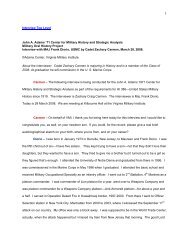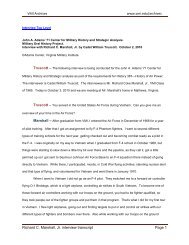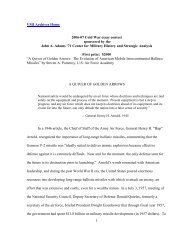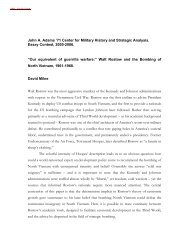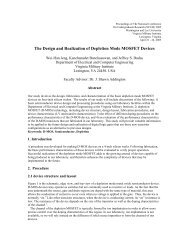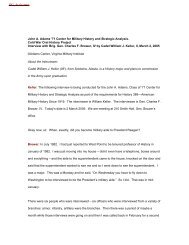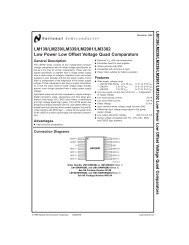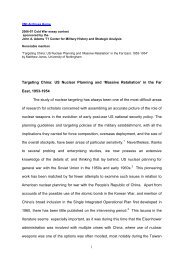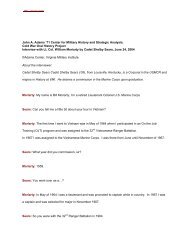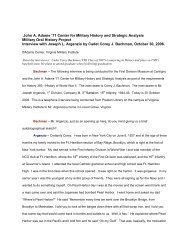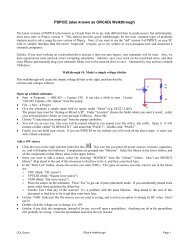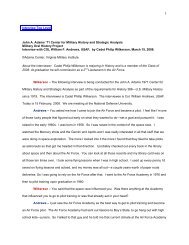Academic Catalog - Virginia Military Institute Admissions
Academic Catalog - Virginia Military Institute Admissions
Academic Catalog - Virginia Military Institute Admissions
Create successful ePaper yourself
Turn your PDF publications into a flip-book with our unique Google optimized e-Paper software.
HISTORY CURRICULUM<br />
The history curriculum is designed to produce men and<br />
women educated in the responsibilities of citizenship. It prepares<br />
cadets for graduate schools of history or government, and for<br />
occupations in which the ability to understand backgrounds,<br />
grasp issues, and manage affairs is essential, e.g., law, business,<br />
politics, government service, and the armed forces.<br />
The curriculum, with proper electives, fully meets the<br />
requirements for admission to outstanding schools of law and<br />
graduate programs in business administration and management,<br />
as well as history. By concentrating electives in a specific subject<br />
area, cadets can acquire both the broad outlook offered by history<br />
and the specific outlook of other disciplines.<br />
The cadet majoring in history receives, first of all, training<br />
in the natural sciences, mathematics, and the English language<br />
as an instrument of written and oral communication. Additionally<br />
the cadet learns a foreign language. History courses cover the<br />
principal fields of modern European, Middle Eastern, East Asian,<br />
Latin American, African, and American history. Rather than merely<br />
cataloguing events of the past, these courses emphasize an<br />
understanding of developments and problems, and they give<br />
attention to social, economic, and cultural phenomena, as well<br />
as political and constitutional problems.<br />
As history majors advance through the curriculum, they apply<br />
the lessons of previous courses to challenging new subjects.<br />
Students in 100-level World History comprehend fundamental<br />
themes, issues, and trends in global history. Students in 200-level<br />
United States history explore and analyze increasingly complex<br />
themes, issues, and trends in U.S. history. Students in 300-level<br />
courses develop a detailed knowledge of a specific field's major<br />
historical events and themes, and where appropriate acquire a<br />
functional understanding of relevant historical geography. Each<br />
level of the history curriculum is associated with a set of essential<br />
skills. Students in 100-level World History sharpen essential<br />
college-level skills such as note-taking, critical reading, and<br />
studying for both objective and analytical exams. Students in<br />
200-level United States history interpret primary sources and<br />
base an argument on them, evaluate secondary sources, and<br />
cite sources. Students in 300-level courses evaluate the thesis<br />
and evidence in essential historical essays or books, and identify<br />
significant historiographical trends. In HI 200 and those 300-level<br />
courses designated as methodologically intensive, students<br />
learn the basic techniques of historical research, analysis and<br />
documentation. They employ common library and electronic<br />
research tools, and use book reviews or review essays to assess<br />
a field's major literature. In 400-level courses, students frame a<br />
research topic, locate and evaluate relevant primary and secondary<br />
evidence, and discuss relevant historiography.<br />
The capstone course requirement ensures that all majors<br />
gain experience in historical methodology and writing. An Honors<br />
Program, open to majors who have demonstrated excellence in the<br />
study of history, and a Directed Study course offer opportunities<br />
to engage in more extensive research and write a paper under<br />
the close supervision of a faculty sponsor.<br />
history curriculum requirements<br />
See the synopsis of the history curriculum on page 59.<br />
<strong>Institute</strong> Core Curriculum: Note that WR 101 and 102<br />
must be passed with a grade of C or better. The required core<br />
curriculum mathematics sequence may be filled with one of<br />
the following course sequences: MA 105/106, MA 123/124 or<br />
MA 125/126. All VMI students are required to take two writingintensive<br />
courses, at least one of which must be within their major<br />
department. Listings of courses to be offered in each coming<br />
semester indicate writing-intensive courses with the suffix W<br />
following the course number.<br />
Department of History Core Curriculum: History majors<br />
and minors must earn a grade of C or better in the following<br />
courses: HI 103, 104, 200, 205 or 205W, 206. History majors<br />
must take at least thirty-six hours of history, including the fifteen<br />
required hours of HI 103, 104, 200, 205 or 205W, and 206, 460W.<br />
Please note that the Department of History will not accept Western<br />
Civilization courses as a substitute for World History. They can<br />
be transferred in only as history electives. Nor does the History<br />
Department allow transfer credit for internet-based or distancelearning<br />
courses.<br />
Regional Distribution: History majors must take at least one<br />
course from each of three regional categories (Europe, United<br />
States, and Africa/Asia/Latin America). These categories are<br />
designated in the history course listings. Courses may be counted<br />
only for one regional category. The Capstone course (460W) cannot<br />
be used to satisfy a regional distribution requirement.<br />
Introduction to Methodology: History majors must take HI<br />
200 “Introduction to Historical Methods,” earning a grade of<br />
"c" or better as a prerequisite for one of the 300-level courses<br />
designated as methodologically intensive. Completion of at least<br />
one 300-level “M” course is a prerequisite to enrollment in HI<br />
460W. Cadets completing this requirement must demonstrate<br />
ability to construct an annotated bibliography and to cite sources<br />
in accordance with departmental standards. Any methodological<br />
course may also fulfill a regional requirement.<br />
Capstone Course: History majors must take HI 460W, during<br />
their first class year. The history department may direct individuals<br />
to enroll in HI 460W in either fall or spring semester, however. The<br />
course requires a major research paper. Topics for the course<br />
will vary. (Note: individual sections of HI 460W may have special<br />
prerequisites.) Substitutions for HI 460W are rare but with prior<br />
approval by the department head, may be allowed for comparable<br />
work while in residence at VMI, e.g., an orally defended thesis<br />
for <strong>Institute</strong> Honors or the three-semester departmental honors<br />
sequence of HI 372, HI 491W, and HI 492W.<br />
The third class English electives may be filled with any<br />
literature course offered by the Department of English and Fine<br />
Arts.<br />
The third class science elective may be filled with any course<br />
offered in astronomy, biology, chemistry, computer science,<br />
Geology, or Physics. CE 208 may also be applied.<br />
The minimum foreign language requirement for history majors<br />
is one foreign language through the third-year level, or two foreign<br />
languages, each through the second-year level.<br />
57





